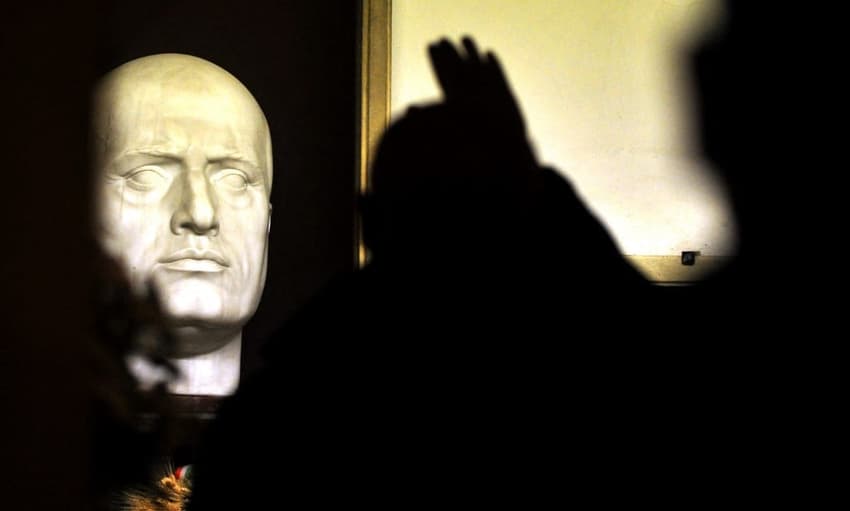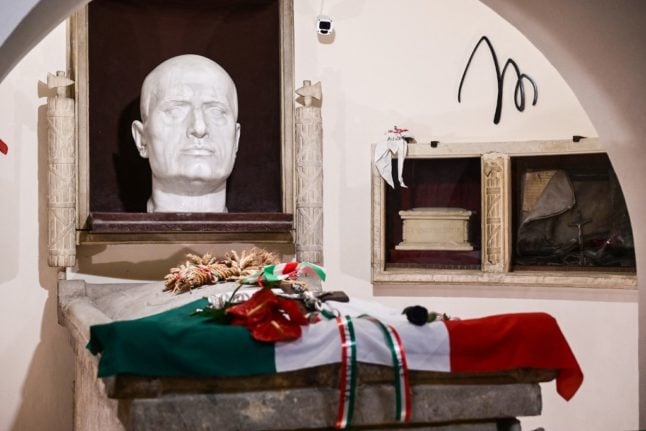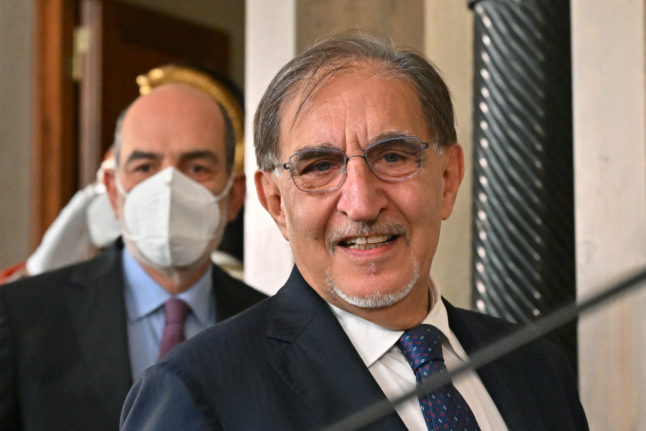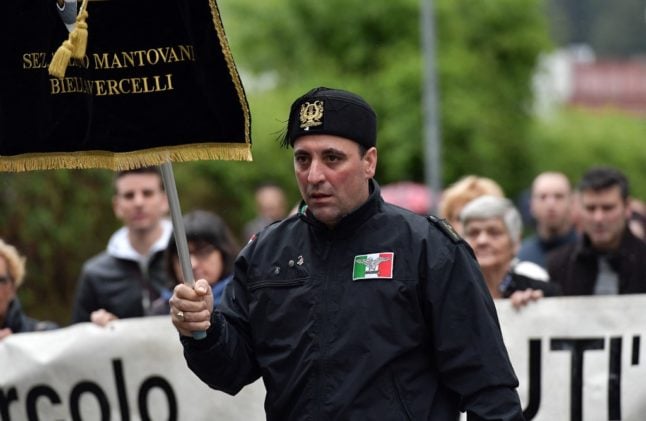Italy reckons with legacy of fascism 100 years after march on Rome

On October 28th 1922, Benito Mussolini's Fascist blackshirts stormed Rome, marking the start of a dictatorship still viewed with indulgence in Italy today.
The centenary of the so-called March on Rome on Friday comes as the election of a far-right political party has revived public debate on the legacy of fascism.
Unlike in Germany or Spain, where only a handful of extremists still revere Adolf Hitler or the Franco dictatorship, attitudes to Mussolini in Italy are far more ambiguous.
Many prominent figures in Italy’s new government have spoken of their admiration for Mussolini, including new prime minister Giorgia Meloni herself, who as a teenage activist praised Mussolini as a “good politician, the best in the last 50 years” in a French TV interview.
In 2013, then-Prime Minister Silvio Berlusconi - who leads one of the parties in today’s government - repeated a claim heard frequently among the far right: that Mussolini’s enactment of racial laws against Jews were a "mistake”, and said Mussolini “in many other ways had done well".
Mussolini’s authoritarian, anti-democratic Fascist regime began stripping rights from Jewish people in 1938.
Under the regime, which ran until July 1943, more than 7,000 Italian Jewish men, women and children were murdered in Nazi death camps.
READ ALSO: Four places to remember the Holocaust in Italy
While few sympathisers will defend Mussolini’s racial laws - at least, not openly - the sentiments expressed by Meloni and Berlusconi are not at all unusual in Italy.
"A large part of the population has never truly come to terms with Fascism," Valerio Alfonso Bruno, an analyst at the Centre for Analysis of the Radical Right in London, told AFP.

The tomb of Italian Fascist dictator Benito Mussolini in the town of Predappio. One hundred years after he took power, the cult of Mussolini persists in Italy and his tomb draws tens of thousands of visitors each year. Photo by MIGUEL MEDINA / AFP
Mussolini's regime celebrated military might and intense nationalism, and in Italy today there remains "this cult of the strong personality, the strongman, the autocrat who governs without worrying about democracy", Bruno said.
Mussolini is often praised for having supposedly provided Italy with much-needed infrastructure, from trains to highways, as well as social welfare programmes - even if many of these projects were already underway when he took office.
Berlusconi’s comments showed "the extent to which Italy still has trouble seriously accepting its own history and its own responsibilities", the head of the Union of Italian Jewish Communities, Renzo Gattegna, said at the time.
Gattegna's observation is still relevant today.
READ ALSO: Is Brothers of Italy a ‘far right’ party?
According to an October 2021 poll, 66 percent of 16- to 25-year-olds believe Mussolini's Fascist regime was a dictatorship that must be condemned in part, but which also had “beneficial” effects.
Only 29 percent of those questioned by the Ipsos research institute, on behalf of a national association of former deportees, said Mussolini was to be entirely condemned.
And for five percent of under-25s, Fascism was considered a positive form of government.

The new President of the Italian Senate, member of Italian far-right Brothers of Italy party Ignazio La Russa, is a collector of fascist memorabilia. Photo by Alberto PIZZOLI / AFP.
While today, statues of controversial historical figures are being removed in countries such as the United States and Britain, physical reminders of "Il Duce" remain intact throughout Italy - and there has so far been little public appetite for their removal.
In just one of many prominent examples, an obelisk inscribed with the words "Mussolini Dux" still sits a stone's throw from the Olympic stadium in Rome, with no note of context.
Portraits of the dictator still adorn the walls of some government ministries.
And while a post-war law theoretically bans the apology for - or justification of - Fascism, it is not enforced.
Websites flourish online praising the memory of the "ventennio", the two decades Mussolini was in power, and shops sell souvenirs adorned with pictures of the dictator's face.
In Predappio, a small town in northern Italy where Mussolini was born and buried, his tomb in the family chapel attracts tens of thousands of visitors each year, while extreme right-wing groups visit to celebrate the dictator on significant anniversaries.

Far-right militants hold a rally to celebrate the life and the death of Benito Mussolini in Predappio every year on April 24th. Photo by TIZIANA FABI / AFP
"This memory is certainly tolerated, not just in Predappio," said analyst Bruno. And in recent years, he added, this tolerance of fascism had increased.
Only last month, a prominent member of Meloni’s Brothers of Italy party, Ignazio La Russa, said on national television: "We are all heirs of Il Duce.”
La Russa, who collects Fascist memorabilia including busts of Mussolini, has just been elected speaker of the Senate.
READ ALSO: Who’s who in Italy’s new hard-right government?
Brothers of Italy maintains the original Fascist party slogan and the tricolour flame logo used by the post-fascist MSI, a movement founded after the war by Mussolini's supporters.
Despite a long list of connections - not least Giorgia Meloni’s own history as an activist in the MSI - the new prime minister insists that her far-right party is “not Fascist”.
In her first speech to parliament this week she insisted she had "never felt sympathy or closeness to undemocratic regimes... including Fascism".
Comments (1)
See Also
The centenary of the so-called March on Rome on Friday comes as the election of a far-right political party has revived public debate on the legacy of fascism.
Unlike in Germany or Spain, where only a handful of extremists still revere Adolf Hitler or the Franco dictatorship, attitudes to Mussolini in Italy are far more ambiguous.
Many prominent figures in Italy’s new government have spoken of their admiration for Mussolini, including new prime minister Giorgia Meloni herself, who as a teenage activist praised Mussolini as a “good politician, the best in the last 50 years” in a French TV interview.
In 2013, then-Prime Minister Silvio Berlusconi - who leads one of the parties in today’s government - repeated a claim heard frequently among the far right: that Mussolini’s enactment of racial laws against Jews were a "mistake”, and said Mussolini “in many other ways had done well".
Mussolini’s authoritarian, anti-democratic Fascist regime began stripping rights from Jewish people in 1938.
Under the regime, which ran until July 1943, more than 7,000 Italian Jewish men, women and children were murdered in Nazi death camps.
READ ALSO: Four places to remember the Holocaust in Italy
While few sympathisers will defend Mussolini’s racial laws - at least, not openly - the sentiments expressed by Meloni and Berlusconi are not at all unusual in Italy.
"A large part of the population has never truly come to terms with Fascism," Valerio Alfonso Bruno, an analyst at the Centre for Analysis of the Radical Right in London, told AFP.

Mussolini's regime celebrated military might and intense nationalism, and in Italy today there remains "this cult of the strong personality, the strongman, the autocrat who governs without worrying about democracy", Bruno said.
Mussolini is often praised for having supposedly provided Italy with much-needed infrastructure, from trains to highways, as well as social welfare programmes - even if many of these projects were already underway when he took office.
Berlusconi’s comments showed "the extent to which Italy still has trouble seriously accepting its own history and its own responsibilities", the head of the Union of Italian Jewish Communities, Renzo Gattegna, said at the time.
Gattegna's observation is still relevant today.
READ ALSO: Is Brothers of Italy a ‘far right’ party?
According to an October 2021 poll, 66 percent of 16- to 25-year-olds believe Mussolini's Fascist regime was a dictatorship that must be condemned in part, but which also had “beneficial” effects.
Only 29 percent of those questioned by the Ipsos research institute, on behalf of a national association of former deportees, said Mussolini was to be entirely condemned.
And for five percent of under-25s, Fascism was considered a positive form of government.

While today, statues of controversial historical figures are being removed in countries such as the United States and Britain, physical reminders of "Il Duce" remain intact throughout Italy - and there has so far been little public appetite for their removal.
In just one of many prominent examples, an obelisk inscribed with the words "Mussolini Dux" still sits a stone's throw from the Olympic stadium in Rome, with no note of context.
Portraits of the dictator still adorn the walls of some government ministries.
And while a post-war law theoretically bans the apology for - or justification of - Fascism, it is not enforced.
Websites flourish online praising the memory of the "ventennio", the two decades Mussolini was in power, and shops sell souvenirs adorned with pictures of the dictator's face.
In Predappio, a small town in northern Italy where Mussolini was born and buried, his tomb in the family chapel attracts tens of thousands of visitors each year, while extreme right-wing groups visit to celebrate the dictator on significant anniversaries.

"This memory is certainly tolerated, not just in Predappio," said analyst Bruno. And in recent years, he added, this tolerance of fascism had increased.
Only last month, a prominent member of Meloni’s Brothers of Italy party, Ignazio La Russa, said on national television: "We are all heirs of Il Duce.”
La Russa, who collects Fascist memorabilia including busts of Mussolini, has just been elected speaker of the Senate.
READ ALSO: Who’s who in Italy’s new hard-right government?
Brothers of Italy maintains the original Fascist party slogan and the tricolour flame logo used by the post-fascist MSI, a movement founded after the war by Mussolini's supporters.
Despite a long list of connections - not least Giorgia Meloni’s own history as an activist in the MSI - the new prime minister insists that her far-right party is “not Fascist”.
In her first speech to parliament this week she insisted she had "never felt sympathy or closeness to undemocratic regimes... including Fascism".
Join the conversation in our comments section below. Share your own views and experience and if you have a question or suggestion for our journalists then email us at [email protected].
Please keep comments civil, constructive and on topic – and make sure to read our terms of use before getting involved.
Please log in here to leave a comment.